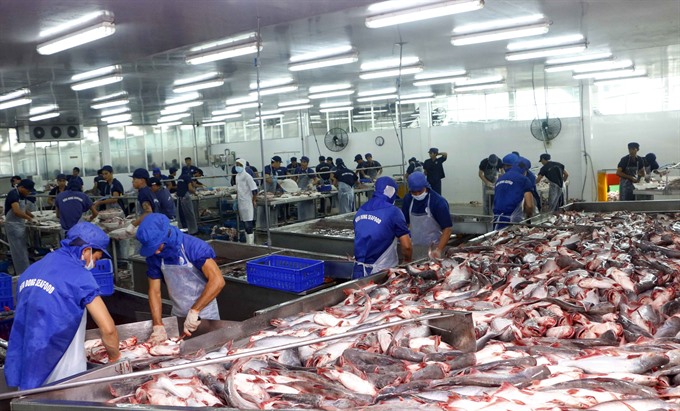 Economy
Economy

The domestic tra fish industry is facing a boom in the development of production at present, according to experts and enterprises.
 |
| Tra fish is processed for export at Biển Đông Seafood Co Ltd in Trà Nóc II Industrial Zone in the southern city of Cần Thơ. — VNA/VNS Photo Thanh Liêm |
HÀ NỘI — The domestic tra fish industry is facing a boom in the development of production at present, according to experts and enterprises.
The boom in the industry has opened a potentially dangerous situation in which supply exceeds demand, potentially leading to a bubble.
Nguyễn Minh Phương, director of Minh Đức Thành Co Ltd in Cần Thơ, said prices of tra fish now stand at a record of VNĐ31,000 per kilo of regular, and VNĐ70,000 per 30 unit kilo of specificly bred tra fish varieties, a year-on-year increase of 70 per cent and three times, respectively.
With such prices, farmers have earned a profit of VNĐ4,000 per kilo from rearing tra fish and VNĐ40,000 per kilo from developing tra fish varieties.
Dương Nghĩa Quốc, chairman of the Việt Nam Tra Fish Association, said the current demand for tra fish is estimated to reach 1.2 million tonnes per year, while demand for tra fish varieties is expected to reach a maximum of 2-2.5 billion units per year.
Farmers in many regions, especially in the provinces of Long An and Đồng Tháp, are promoting the production of tra fish varieties, which would push the tra fish industry into a situation of oversupply, Quốc said.
Enterprises and experts said this is dangerous because growth in the supply of tra fish will be faster than demand in the market, leading to high surplus, price reductions and ultimately losses for producers, reported Thời báo Kinh doanh newspaper.
Phương said the market still shows a great demand for tra fish but the future is unpredictable. The demand for this product is expected to increase in the future if the United States reduces trade barriers, and exports to the EU and China continue their current recovery.
Nevertheless, if demand in the US and European markets remains unchanged, while the demand in China reduces, the price of tra fish would reduce accordingly, Phương said.
Even if the demand goes up, enterprises and producers should not increase the supply, he said, as the US has imposed an anti-dumping tariff on Vietnamese tra fish, and other export markets remain risky.
Vũ Văn Tám, deputy minister of agriculture and rural development, said the tra fish industry should now be developed under a regulated production chain, and must ensure strict quality requirements in the production of fish varieties, quarantine and food safety.
Tra fish is a key national product, and export markets require high technical standards production, he said. Provinces must manage tra fish production for the long-term sustainable development of exports and not for benefits in the short term.
At present, China is the largest export market of Vietnamese tra fish products, but enterprises should be careful when exporting the product to this market as it is facing risks, Phương said.
Quốc agreed and noted that exports to the US in 2017 reduced by 11 per cent against the previous year, and are expected to continue reducing this year.
Meanwhile, local tra fish exporters are concerned about how much the US Department of Commerce will increase the anti-dumping tariff in the 14th administrative review for Vietnamese tra fish, he said. Other markets have built trade barriers for Vietnamese tra fish products for exports as well.
The lack of stability in the Chinese market means that diversification of export markets are essential, he said.
Local exporters should seek new markets within the ASEAN community, and in the Middle East, he said.
Việt Nam is expected to gain an export value of $2-2.2 billion from exporting tra fish this year. — VNS




